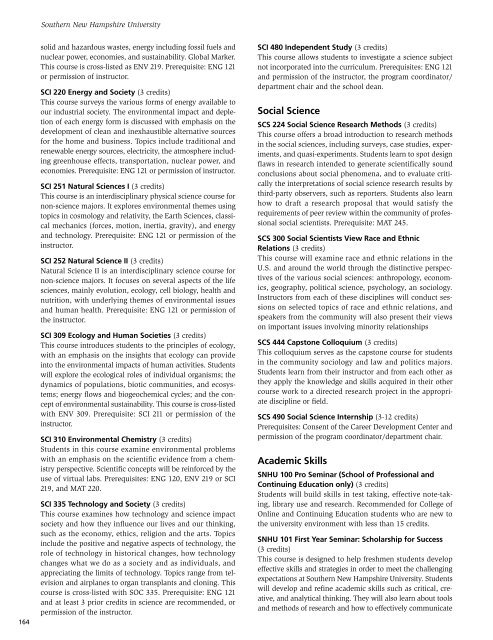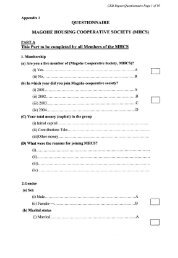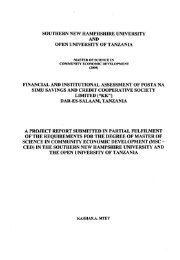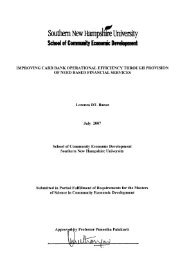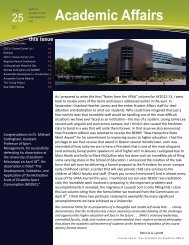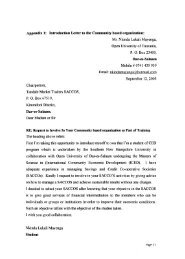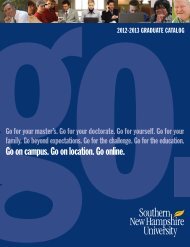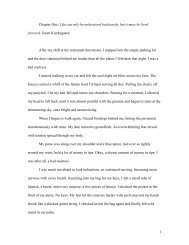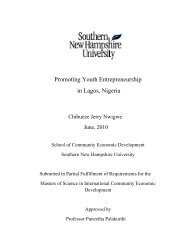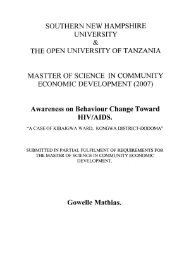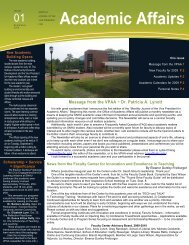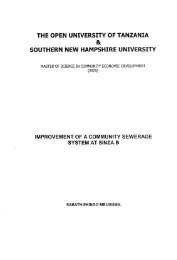Undergraduate Catalog 2010-2011 - SNHU Academic Archive ...
Undergraduate Catalog 2010-2011 - SNHU Academic Archive ...
Undergraduate Catalog 2010-2011 - SNHU Academic Archive ...
Create successful ePaper yourself
Turn your PDF publications into a flip-book with our unique Google optimized e-Paper software.
Southern New Hampshire University<br />
164<br />
solid and hazardous wastes, energy including fossil fuels and<br />
nuclear power, economies, and sustainability. Global Marker.<br />
This course is cross-listed as ENV 219. Prerequisite: ENG 121<br />
or permission of instructor.<br />
SCI 220 Energy and Society (3 credits)<br />
This course surveys the various forms of energy available to<br />
our industrial society. The environmental impact and depletion<br />
of each energy form is discussed with emphasis on the<br />
development of clean and inexhaustible alternative sources<br />
for the home and business. Topics include traditional and<br />
renewable energy sources, electricity, the atmosphere including<br />
greenhouse effects, transportation, nuclear power, and<br />
economies. Prerequisite: ENG 121 or permission of instructor.<br />
SCI 251 Natural Sciences I (3 credits)<br />
This course is an interdisciplinary physical science course for<br />
non-science majors. It explores environmental themes using<br />
topics in cosmology and relativity, the Earth Sciences, classical<br />
mechanics (forces, motion, inertia, gravity), and energy<br />
and technology. Prerequisite: ENG 121 or permission of the<br />
instructor.<br />
SCI 252 Natural Science II (3 credits)<br />
Natural Science II is an interdisciplinary science course for<br />
non-science majors. It focuses on several aspects of the life<br />
sciences, mainly evolution, ecology, cell biology, health and<br />
nutrition, with underlying themes of environmental issues<br />
and human health. Prerequisite: ENG 121 or permission of<br />
the instructor.<br />
SCI 309 Ecology and Human Societies (3 credits)<br />
This course introduces students to the principles of ecology,<br />
with an emphasis on the insights that ecology can provide<br />
into the environmental impacts of human activities. Students<br />
will explore the ecological roles of individual organisms; the<br />
dynamics of populations, biotic communities, and ecosystems;<br />
energy flows and biogeochemical cycles; and the concept<br />
of environmental sustainability. This course is cross-listed<br />
with ENV 309. Prerequisite: SCI 211 or permission of the<br />
instructor.<br />
SCI 310 Environmental Chemistry (3 credits)<br />
Students in this course examine environmental problems<br />
with an emphasis on the scientific evidence from a chemistry<br />
perspective. Scientific concepts will be reinforced by the<br />
use of virtual labs. Prerequisites: ENG 120, ENV 219 or SCI<br />
219, and MAT 220.<br />
SCI 335 Technology and Society (3 credits)<br />
This course examines how technology and science impact<br />
society and how they influence our lives and our thinking,<br />
such as the economy, ethics, religion and the arts. Topics<br />
include the positive and negative aspects of technology, the<br />
role of technology in historical changes, how technology<br />
changes what we do as a society and as individuals, and<br />
appreciating the limits of technology. Topics range from television<br />
and airplanes to organ transplants and cloning. This<br />
course is cross-listed with SOC 335. Prerequisite: ENG 121<br />
and at least 3 prior credits in science are recommended, or<br />
permission of the instructor.<br />
SCI 480 Independent Study (3 credits)<br />
This course allows students to investigate a science subject<br />
not incorporated into the curriculum. Prerequisites: ENG 121<br />
and permission of the instructor, the program coordinator/<br />
department chair and the school dean.<br />
Social Science<br />
SCS 224 Social Science Research Methods (3 credits)<br />
This course offers a broad introduction to research methods<br />
in the social sciences, including surveys, case studies, experiments,<br />
and quasi-experiments. Students learn to spot design<br />
flaws in research intended to generate scientifically sound<br />
conclusions about social phenomena, and to evaluate critically<br />
the interpretations of social science research results by<br />
third-party observers, such as reporters. Students also learn<br />
how to draft a research proposal that would satisfy the<br />
requirements of peer review within the community of professional<br />
social scientists. Prerequisite: MAT 245.<br />
SCS 300 Social Scientists View Race and Ethnic<br />
Relations (3 credits)<br />
This course will examine race and ethnic relations in the<br />
U.S. and around the world through the distinctive perspectives<br />
of the various social sciences: anthropology, economics,<br />
geography, political science, psychology, an sociology.<br />
Instructors from each of these disciplines will conduct sessions<br />
on selected topics of race and ethnic relations, and<br />
speakers from the community will also present their views<br />
on important issues involving minority relationships<br />
SCS 444 Capstone Colloquium (3 credits)<br />
This colloquium serves as the capstone course for students<br />
in the community sociology and law and politics majors.<br />
Students learn from their instructor and from each other as<br />
they apply the knowledge and skills acquired in their other<br />
course work to a directed research project in the appropriate<br />
discipline or field.<br />
SCS 490 Social Science Internship (3-12 credits)<br />
Prerequisites: Consent of the Career Development Center and<br />
permission of the program coordinator/department chair.<br />
<strong>Academic</strong> Skills<br />
<strong>SNHU</strong> 100 Pro Seminar (School of Professional and<br />
Continuing Education only) (3 credits)<br />
Students will build skills in test taking, effective note-taking,<br />
library use and research. Recommended for College of<br />
Online and Continuing Education students who are new to<br />
the university environment with less than 15 credits.<br />
<strong>SNHU</strong> 101 First Year Seminar: Scholarship for Success<br />
(3 credits)<br />
This course is designed to help freshmen students develop<br />
effective skills and strategies in order to meet the challenging<br />
expectations at Southern New Hampshire University. Students<br />
will develop and refine academic skills such as critical, creative,<br />
and analytical thinking. They will also learn about tools<br />
and methods of research and how to effectively communicate


